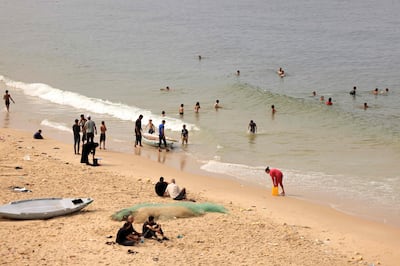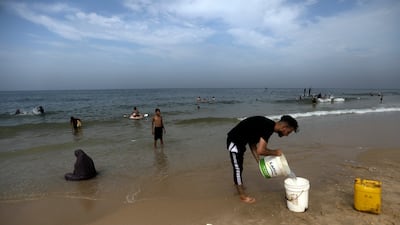Live updates: Follow the latest news on Israel-Gaza
People in southern Gaza have been forced to use seawater to wash their clothes and dishes, as clean water runs out across the enclave.
For the past three weeks, residents of the north have been told by Israel to move to south as the country launches strikes and incursions.
Gazans face an increasingly dire humanitarian situation as electricity, food and clean water run low.
“I took a pause from what is happening in Gaza and entered the sea to be able to breathe,” Ibrahim Sulieman, a resident from Gaza city, told The National.
Despite cold temperatures, people are washing themselves and their clothes in the sea.
"It is the only way to clean myself and pray," Mr Sulieman said at the beach of Deir Al Balah, in central Gaza.
He and 37 family members have taken shelter in schools run by the UN agency for Palestinian refugees.
a mother of three in Gaza
Israel has expanded its ground incursion into the Gaza Strip as overnight air strikes hit areas close to hospitals, where tens of thousands of Palestinians have sought shelter alongside thousands of wounded.
Before the war broke out, Israel used three pipelines to supply the Gaza Strip with 18 million cubic metres of potable water a year, or about nine per cent of the enclave’s annual use.
The rest – about 200 million cubic metres of water a year – is produced in the enclave.
That water is pumped from the coastal aquifer beneath the strip and Israel’s coastal plain, or taken from the Mediterranean and desalinated.
Israel has allowed some water to flow through one of the pipelines, but a lack of fuel means other sources cannot be pumped and cleaned.
Some supplies have entered the strip from Egypt at the Rafah border crossing, but humanitarian agencies say much more aid needs to be allowed in.

Yasmin Ataar, a mother of three, told The National she washed her children's clothes using seawater.
"I have nowhere to go to wash these clothes, or to dry them. I am making my children wear damp clothing," she said.
Her daughter has kidney problems, which means she needs clean drinking water.
"Only God knows our suffering and what we are going through," Ms Ataar said.
Maryam Lawa, 42, said the sea is the only source of water her family has.
"I want the world to know what we are going through. We need help," she said.
A lack of clean water can lead to the spread of infections including cholera and dysentery, aid groups have warned.
The World Health Organisation said a lack of water puts lives in danger, with hospitals across Gaza struggling to treat thousands of patients.
“Water is needed to ensure sanitary conditions on inpatient wards, in operation rooms and emergency departments. It is essential for the prevention of hospital associated infections and for the prevention of outbreaks in hospitals,” the WHO said in a statement.


